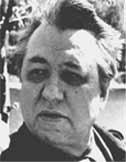 Alexander Alexandrovich Milchakov was born on March 16, 1931. From the hospital, he was immediately brought to a new apartment at home on the boardwalk, thus becoming the first newborn child of our home.
Alexander Alexandrovich Milchakov was born on March 16, 1931. From the hospital, he was immediately brought to a new apartment at home on the boardwalk, thus becoming the first newborn child of our home.
His father Alexander Ivanovich Milchakov (1903-1973) worked in the governing bodies of Komsomol, in 1928-29 GG. He was secretary-general of the Komsomol. From 1932 to 1938. He was in leading work in the gold industry of the USSR. At the end of 1938. had been repressed and had been in Norilsk and Magadan camps for over 16 years. In 1954, Rehabilitated returned to Moscow.
In 1949, Sasha Milchakov graduated from the school 12 in the Staro-quarter Alley, then board of Mcti it. Mendeleev. After receiving a diploma in engineering and work in the workplace, he devotes himself to literary creativity and journalism. He graduated from the Literary Institute. a.m. The bitter, working in a series of newspapers and magazines ("Innovator and inventor", "Change", "The Moscow Truth"). For many years he worked as a Programm podrobnosti in the edition of the newspaper "work" and then as the senior editor in the television USSR. His own Peru has a number of books, essays and stories. He was "troubled in the city" by filming a miniseries film on Dovzhenko's name. The book has been translated into several foreign languages and published in a number of countries in Eastern Europe.
Many remember the television broadcast of Vladimir Molchanov "before and After Midnight" in the late 1980s. With the story of journalist A. Milchakov-"Rosstannaja Road" on the sites of the secret graves of the firing squad in Moscow and the region during the years of Stalin's terror. We also remember his numerous publications on the pages of the evening Moscow, demanding the opening of the KGB archives and naming the firing squad and the burial sites of their ashes. In the early 1990s, A.A. Milchakov was chairman of the Moscow Commission on finding places for the victims of political repression in Moscow and the field.
Alexander Alexandrovich Milchakov left his life on 29 January 2004 and was buried together with his parents in the Novodevichy Cemetery. He was a worthy son of his father, a century of which was celebrated in 2003. Both of them, both the father and the son, each in their own way, defended the ideals of justice and civic dignity.
